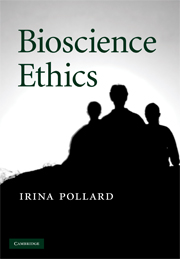Book contents
- Frontmatter
- Contents
- Preface
- Acknowledgements
- 1 Human origins, natural selection and the evolution of ethics
- 2 Sex determination, brain sex and sexual behaviour
- 3 Inappropriate lifestyle and congenital disability in children: basic principles of growth, toxicology, teratogenesis and mutagenesis
- 4 Substance abuse and parenthood: biological mechanisms – bioethical responsibilities
- 5 Fertility awareness: the ovulatory method of birth control, ageing gametes and congenital malformation in children
- 6 Understanding child abuse and its biological consequences
- 7 The state of wellbeing: basic principles, coping strategies and individual mastery
- 8 The state of wellbeing: on the end-of-life care and euthanasia
- 9 Current reproductive technologies: achievements and desired goals
- 10 The recombinant DNA technologies
- 11 Stem cells, nuclear transfer and cloning technology
- 12 Human-dominated ecosystems: re-evaluating environmental priorities
- 13 Human-dominated ecosystems: reclaiming the future for following generations
- 14 Human-dominated ecosystems: warfare = fitness enhancement or losing strategy?
- 15 Human-dominated ecosystems: reworking bioethical frontiers
- Further reading
- Index
3 - Inappropriate lifestyle and congenital disability in children: basic principles of growth, toxicology, teratogenesis and mutagenesis
Published online by Cambridge University Press: 17 February 2010
- Frontmatter
- Contents
- Preface
- Acknowledgements
- 1 Human origins, natural selection and the evolution of ethics
- 2 Sex determination, brain sex and sexual behaviour
- 3 Inappropriate lifestyle and congenital disability in children: basic principles of growth, toxicology, teratogenesis and mutagenesis
- 4 Substance abuse and parenthood: biological mechanisms – bioethical responsibilities
- 5 Fertility awareness: the ovulatory method of birth control, ageing gametes and congenital malformation in children
- 6 Understanding child abuse and its biological consequences
- 7 The state of wellbeing: basic principles, coping strategies and individual mastery
- 8 The state of wellbeing: on the end-of-life care and euthanasia
- 9 Current reproductive technologies: achievements and desired goals
- 10 The recombinant DNA technologies
- 11 Stem cells, nuclear transfer and cloning technology
- 12 Human-dominated ecosystems: re-evaluating environmental priorities
- 13 Human-dominated ecosystems: reclaiming the future for following generations
- 14 Human-dominated ecosystems: warfare = fitness enhancement or losing strategy?
- 15 Human-dominated ecosystems: reworking bioethical frontiers
- Further reading
- Index
Summary
I am very much for human rights but I think for the dignity of the human being, it is necessary not only to emphasize the rights, but also the responsibilities.
The emergence of intelligence and discernment in our thinking brain provided a degree of autonomy in forward planning, tool-making, imitation and teaching. Acquisition of sophisticated language made it possible to understand mental states in others, which helped in the creation of a unique hominid social, political, economic, ethical and spiritual order. This chapter describes normal development and how epigenetic influences (that is, all the environmental variables which modulate gene activity) might derail it. Harmful epigenetic influences can trigger intrinsic gene defects (mutations) or adversely modify normal gene expression, resulting in impaired growth and development. Good health, far from being a natural state or universal right, is a matter of achievement, a consequence of privilege or good luck even. It is for this reason that health is defined in the Constitution of the World Health Organization (WHO) as being a state of ‘complete physical, mental and social wellbeing, not merely the absence of disease or infirmity’. This definition succinctly emphasizes the positive aspects of a fully realized genetic potential. Good health can, therefore, be seen as the result of a positive environment supported by socioeconomic advantage. This and the subsequent two chapters are concerned with ways that everyone can improve – maximize – their own and their children's genetic potential. Very few of us come close to fully expressing our genetic potential, but with increased biological understanding we can move closer to enjoying our innate distinctive capabilities.
- Type
- Chapter
- Information
- Bioscience Ethics , pp. 44 - 60Publisher: Cambridge University PressPrint publication year: 2009



